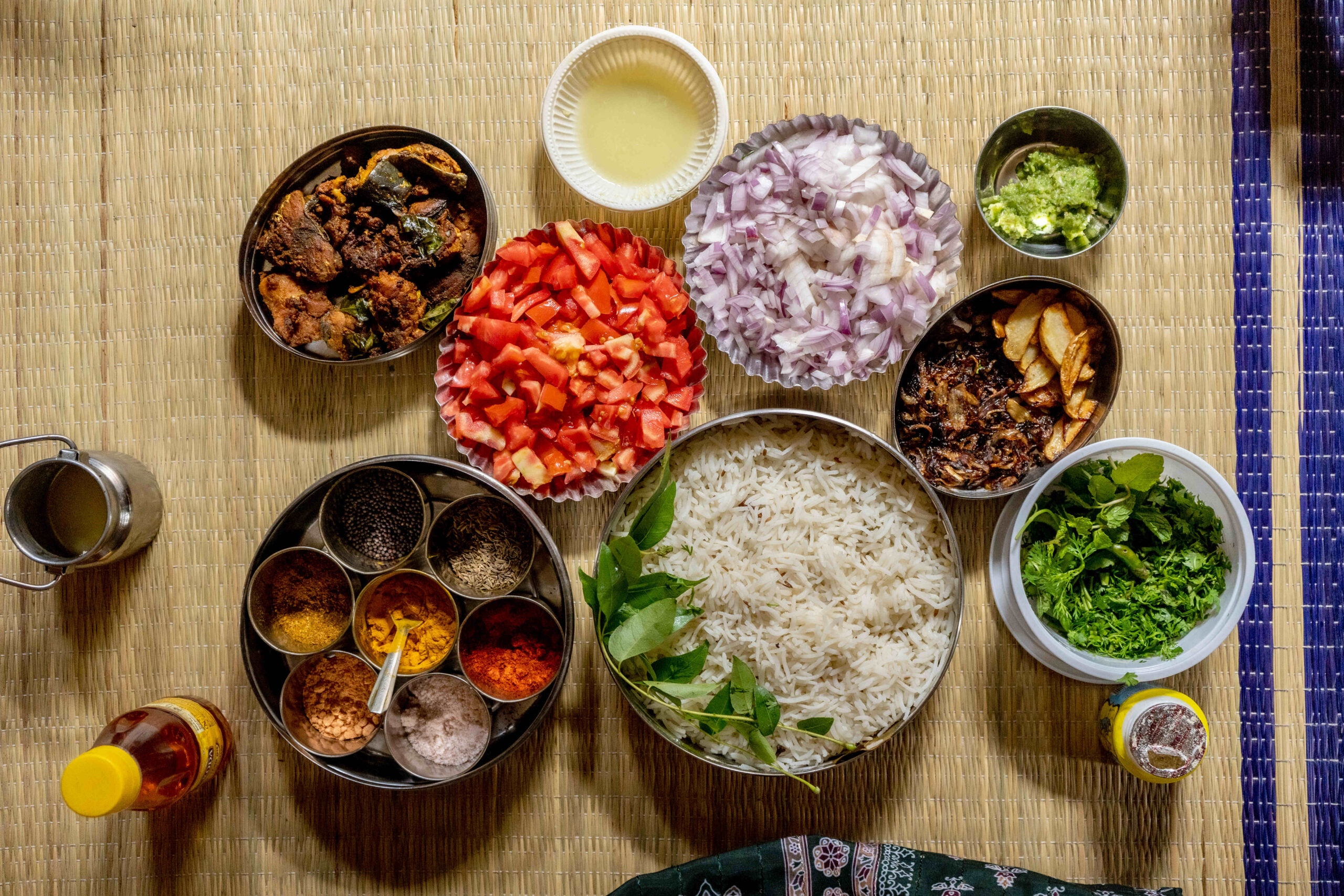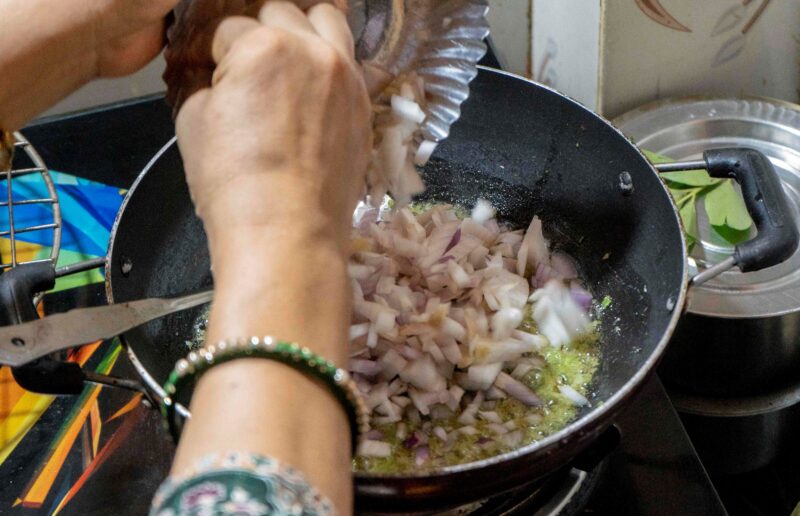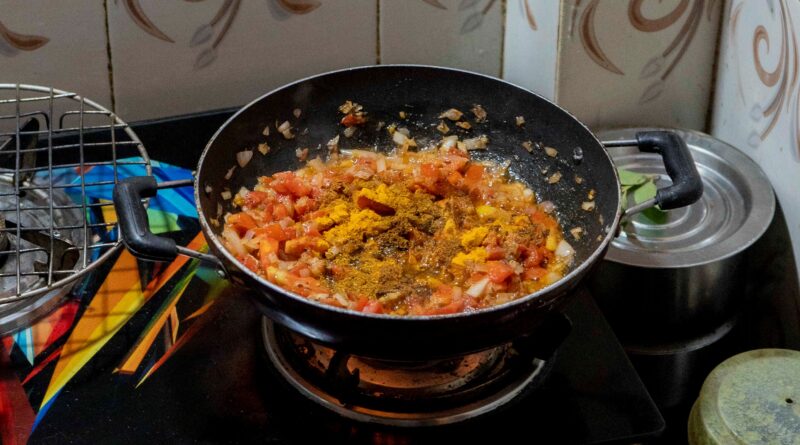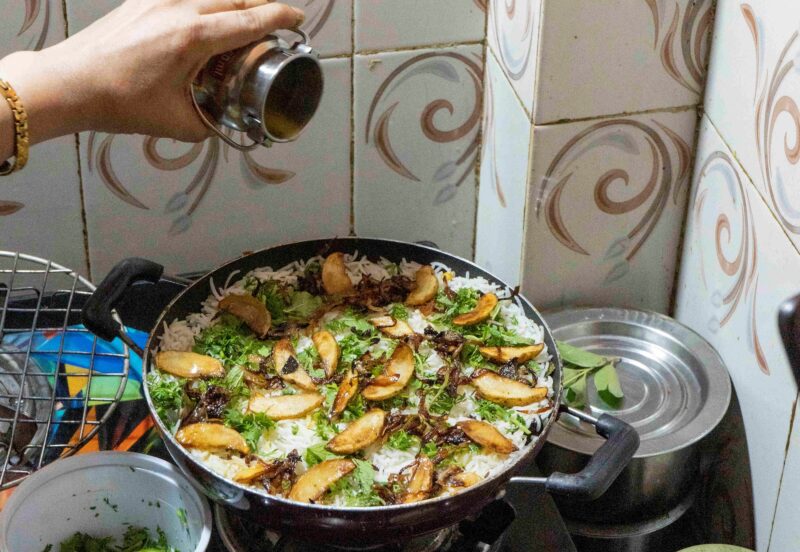
Kupa, or tuna, biryani is a special dish from the Worli Koliwada in Mumbai. The availability of fresh tuna in the region, combined with flavourful spices and lovely seasoned rice, make this dish the special seasonal treat it is. Shraddha, who generously shared this recipe with us, fondly remembers her mother cooking the dish for her family. Today, the biryani is a favourite with her extended family, especially loved by her nephew, who frequently insists that they cook the dish together. Shraddha pairs this dish with the cooling koshimbir salad.
For the marinade
| Garam masala | 1 teaspoon |
|---|---|
| Salt | 1½ teaspoon |
| Biryani masala | 1 teaspoon |
| Pakoda masala | 1 teaspoon |
| Turmeric | 1½ teaspoon |
| Ginger-garlic paste | 1 teaspoon |
| Lime juice | 1 teaspoon |
To fry the fish
| Rice oil (or any other oil) | As required to shallow fry |
|---|---|
| Curry leaves | 5 or 6 |
For the rice
| Cinnamon | 1½ stick |
|---|---|
| Lime juice | 1 tablespoon |
| Ghee | 1 to 2 tablespoons |
| Mint leaves | 20 small leaves |
| Black pepper | 5-6 peppercorns |
| Cardamom | 1 or 2 pods |
| Salt | To taste |
For the biryani masala
| Onions | 2, large |
|---|---|
| Tomatoes | 2, large |
| Ginger-garlic paste | 1 tablespoon |
| Mint leaves | 1½ cup |
| Coriander leaves | 1½ cup |
| Curry leaves | 5 or 6 |
| Ghee | 1 tablespoon |
| Asafoetida or hing | 1½ teaspoon |
| Jeera | 1½ teaspoon |
| Shahi jeera | 1½ teaspoon |
| Turmeric | 1½ teaspoon |
| Garam masala | 1½ teaspoon |
| Biryani masala | 1½ teaspoon |
| Salt | To taste |
For the garnish
| Potatoes, sliced thin | 2 big potatoes |
|---|---|
| Onions, sliced | 3 cups |
| Coriander leaves | 2 tablespoons |
| Oil | 3 tablespoons |
| Salt | 2 tablespoons |
For the koshimbir
| Tomato, chopped | 1 |
|---|---|
| Tomato, chopped | 1 |
| Coriander leaves, chopped | 1 cup |
| Asafoetida or hing powder | 1½ teaspoon |
| Chilli powder | 1½ teaspoon |
| Powdered Khada masala (made from cinnamon, cloves, bay leaf, black stone powder, and star anise) | 1½ teaspoon |
| Mustard seeds, crushed | 1½ teaspoon |
| Lime juice | 1 tablespoon |
| Boondi | 1½ cup |
| Salt | To taste |
What You Will Need
Chop the kupa into small or medium-sized pieces and marinate for 30 minutes with salt, garam masala, biryani masala, pakoda masala, turmeric, ginger-garlic paste and lime juice. Then fry the fish with curry leaves on high heat for 15 minutes. Turn the pieces over, reduce the heat, and fry for another 15 minutes. At this stage, the pieces should have browned well on both sides. Take the fish off the heat and set it aside.
Half cook the rice with coriander, cinnamon, lime juice, ghee, mint leaves, black pepper, and cardamom.
Chop the onion and tomato for the biryani masala, and the potato, onion and coriander for the garnish.
Squeeze the lime and keep the juice ready.
A non-stick pot, a mixing bowl and other vessels and equipment typically available in a fully functional kitchen should suffice.
Instructions
For the biryani (masala), heat 2 tablespoons in a pan and add jeera, shahi jeera, ginger-garlic paste, hing, mint leaves, coriander, curry leaves, and ghee.
Then add the onion, fry until it is fully cooked, and then add salt. Now add chopped tomatoes to the mix.

Add turmeric powder, garam masala and biryani masala and cook the mixture until oil separates from the paste.

Now add the fried kupa, and cook for 2 to 3 minutes.
Add the half-cooked rice over this, sprinkle chopped coriander on the rice, and cover the pot. Let the rice slow-cook for 7 to 8 minutes.

For the garnish, deep fry onion slices with salt and sugar, and set them aside.
In the same pan, add potato slices and fry them until they are fully cooked.
Now, arrange the fried potato and onion, and chopped coriander on the biryani to make it visually appealing.

For the koshimbir, add chopped onions, tomatoes, lemon juice, boondi, salt, chilli powder, khada masala and crushed mustard seeds. Mix them, and garnish the koshimbir with coriander leaves.
Variations
You can deep fry the kupa, instead of shallow frying it.
You can add yogurt, or crushed peanut to the koshimbir.

You can listen to Shraddha Patil narrating the recipe for Kupa Biryani at her home in Worli Koliwada here:
To know more about the story behind the biryani and the kitchen in which Shraddha prepares the dish, you can read our ‘Inside My Kitchen’ feature here.
Shraddha Patil is one of the cooks featured on the food trail organised by The Locavore and RPGF, as a part of the Worli Koliwada Project. She teaches Marathi, Hindi, and English at the Anganwadi in Worli Koliwada. Having learned to cook from her mother and grandmother, Shraddha loves to feed her family and neighbours.
This recipe was translated and documented for The Locavore by Eden Fernandes. Eden is a communications teacher and experienced photographer. In her free time, she loves to write. Photos for this recipe are by Charvi Thakkar and Vineet Velandy.
Note: This recipe would not have been possible without the women from the Worli Koliwada who generously shared their stories, food, and time with us. The Locavore does not intend to speak on behalf of the community, but rather to amplify what has been shared with us by the people of the Worli Koliwada with their permission. The Locavore team has made every effort to maintain a practice of dynamic, informed, and continuous consent while interacting with and gathering data from the community.
The Worli Koliwada Project,initiated by RPG Foundation in collaboration with The Locavore, aims to bring attention to Mumbai’s Worli Koliwada region. The project uses food as a lens to showcase the unique culinary and cultural heritage of the communities in the area, while also providing economic opportunities for the Koliwada’s local residents.
The Heritage Project, an heritage initiative of RPG Foundation, works to bring back to glory, sites of cultural and social importance. It aims to help the masses engage with, relive, and experience our heritage through practical new approaches, keeping in mind the evolving, fast paced world.
The Locavore is partnering with the RPG Foundation to work within the Worli Koliwada geography to provide the tools for self-reliance for the Worli Koliwada community, as a part of their Heritage Revival Project.
RPG Foundation collaborates with Government entities, not-for-profits and other civil society organisations to develop innovative solutions to social challenges in India. They are committed to catalysing sustainable social change through holistic interventions that are impactful, scalable and ultimately help build an equitable society. One such intervention is the Heritage Revival Project.
You must be logged in to rate this recipe.

Sign in with email

